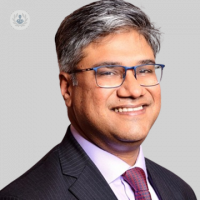Gallbladder polyps: What causes them to develop?
Written in association with:What makes gallbladder polyps grow? Here to answer this question is leading general and hepato-pancreato-biliary surgeon Mr Deepak Hariharan.

What are gallbladder polyps, and what causes them to develop?
Gallbladder polyps are outpouchings or protrusions within the lining of the gallbladder. Polyps within the gallbladder are caused by deposition of cholesterol; as this is the principal component of bile or due to inflammatory changes in the lining of gallbladder, and less frequently abnormal cell division or growth within the gallbladder wall lining.
What are the symptoms of gallbladder polyps, and how are they diagnosed?
The majority of cases with gallbladder polyps are asymptomatic or silent. Polyps in the gallbladder are picked up incidentally on an ultrasound scan. Occasionally some patients present with:
- upper abdominal pain;
- nausea;
- bloating;
- aversion to fatty food, or;
- pain made worse after eating a rich fatty meal.
The diagnosis is established after an ultrasound scan of the liver/gallbladder. In some cases, an MRI scan may be warranted after an ultrasound scan to confirm diagnosis.
Are gallbladder polyps cancerous, and what are the risk factors for developing cancer?
True gallbladder polyps carry the potential to turn cancerous. Risk factors for malignant transformation include:
- The gallbladder polyp size is over 10mm.
Other risks factors include:
- Age over 60 years;
- History of inflammatory condition of biliary tree - primary sclerosing cholangitis (PSC);
- Asian ethnicity, and;
- Flat rather than a protuberant (pedunculated) polyp or focal gallbladder wall thickening is more than 4 mm and/or enlargement of polyp by 2mm over 2-year period whilst patient is under regular ultrasound surveillance.
What are the treatment options for gallbladder polyps, and when is surgery necessary?
Treatment options for gallbladder polyps include surgery or watchful waiting with regular radiological (ultrasound) surveillance under defined criteria.
Surgical treatment in the form of cholecystectomy (removal of gallbladder), often done keyhole or laparoscopically (successful in 97 per cent of cases), is recommended if patient is symptomatic irrespective of polyp size.
In the event the patient is asymptomatic, then surgery is recommended if:
- The size of the polyp is more than 10mm;
- Individuals of Asian descent/ethnicity surgery with gallbladder polyp measures between 6 to 9mm;
- If there is history of inflammatory condition of biliary tree - primary sclerosing cholangitis (PSC), flat rather than a pedunculated polyp, or;
- If the focal gallbladder wall thickening is more than 4 mm, or;
- If there is enlargement of polyp by 2mm within the two-year period whilst patient is under regular ultrasound surveillance.
Ultrasound surveillance is recommended for all other cases. Follow-up ultrasound of the gallbladder is recommended at six months, one year and two years. Surveillance scans should be discontinued after two years in the absence of growth.
Can gallbladder polyps be prevented, and what lifestyle changes can help manage them?
Preventative measures remain unverified and non-evidence based. The cholesterol polyp is a certain frequent type of polyp noted in the gallbladder. Cholesterol remains the primary component of bile and bile is concentrated, stored in the gallbladder and released on demand to aid digestion of fatty meals. Eating healthy well-balanced diet, keeping blood cholesterol levels under check may theoretically reduce the chances of formation of cholesterol polyps.
Do you need expert treatment for gallbladder polyps? Arrange a consultation with Mr Harihan via his Top Doctors profile.


